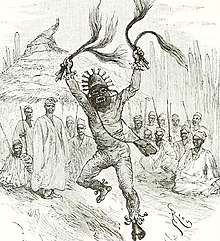Arará religion
Arará religion is a religion indigenous to Cuba. Its origins can be traced to the Ewe-Fon of Dahomey. Many gods known as "luases" are worshiped, similar to the Loa in Vodou, many of which are borrowed from Yoruba gods. Some minor Kongo based rituals are also practiced. Originally the religion had popularity in Matanzas and Santiago de Cuba.[1]
| Part of a series on Vodun related religions called |
| Voodoo |
|---|
 |
|
Deities
|
Even though Vodou gods are venerated rather than Yoruba gods, Santeria practices and linguistics have merged into Arará practices. However, the music and dance of Arará ceremonies continues to be quite different from that of Santeria ceremonies, thus separating the two religions.[2] It has been estimated that around the 1890s or the early 1900s Santeria and Arará religions began mixing, resulting in the Arará adoption of Santeria customs in guidance of ceremonies.[3] Today many practitioners use Yoruba terminology to explain their practices but still continue to use unique ceremonial dances. Some of these dances are noted for their similarity to dances in Haitian Vodou because of both religion's shared heritage but the dances still remain different.[4]
See also
References
- Sanchez, Sara. Afro-Cuban Diasporan Religions: A Comparative Analysis of the Literature and Selected Annotated Bibliography.
- Kuss, Malena. Music in Latin America and the Caribbean.
- Cuban Studies 34.
- Daniel, Yvonne. Dancing Wisdom:Embodied Knowledge in Haitian Vodou, Cuban Yoruba, and Bahian Candomble.